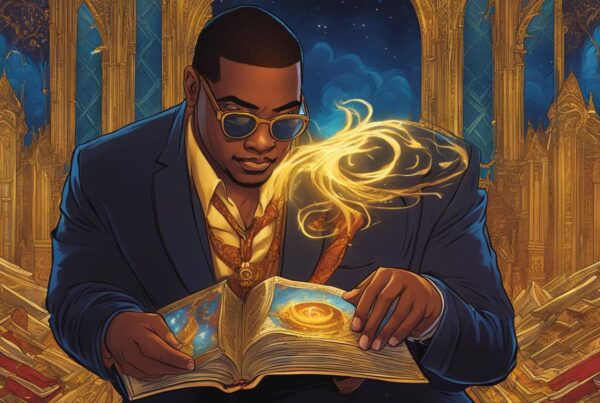Are you looking for a thought-provoking read that will explore the complexities of the past? Look no further than Martin H. Greenberg’s anthology, “Past Imperfect.” This book offers a unique perspective on the past, exploring its impact on the present and the future.
In this article, we will provide a comprehensive overview of “Past Imperfect,” including its key themes, characters, and writing style. Join us on a journey through Greenberg’s insightful and engaging anthology.
Key Takeaways:
- “Past Imperfect” is an anthology that explores the complexities and impact of the past on the present and future.
- The author, Martin H. Greenberg, is an expert in the field of anthologies and brings his expertise to this insightful and engaging work.
- Readers will gain a deeper understanding of the main themes, characters, and writing style of “Past Imperfect.”
- The anthology has received critical acclaim and is highly recommended for those interested in thought-provoking reads.
- For those who enjoy “Past Imperfect,” there are other works by Martin H. Greenberg that explore similar themes and styles.
About the Author
Martin H. Greenberg was a prolific author and editor who made significant contributions to the field of anthologies. Born in 1942, Greenberg grew up in Brooklyn, New York, and later earned a degree in political science from the University of Wisconsin. He went on to publish over 1,000 anthologies across numerous genres, including science fiction, mystery, horror, and fantasy.
Greenberg served as the co-founder of Tekno Books, which specialized in packaging book series for major publishers. He was also a co-founder of the Science Fiction Writers of America and was instrumental in developing the organization’s Nebula Awards.
Throughout his career, Martin H. Greenberg was widely recognized for his editing expertise, earning numerous awards for his work, including the Bram Stoker Award, Edgar Award, and Hugo Award. His commitment to producing high-quality anthologies, as well as his passion for discovering new talent, has cemented his legacy as a prominent and influential figure in the publishing industry.
The depth and breadth of Greenberg’s experience is evident in his work, including “Past Imperfect.” His unique perspective and extensive knowledge of the genre make this anthology a standout addition to any discerning reader’s collection.
Overview of “Past Imperfect”
Published in 2012, “Past Imperfect” is a collection of short stories edited by Martin H. Greenberg. The anthology features tales from some of today’s most celebrated authors of mystery and crime fiction, including Joyce Carol Oates, Charles Todd, and Max Allan Collins.
The stories in “Past Imperfect” revolve around the theme of “the past coming back to haunt us.” From crimes committed long ago to secrets thought buried in the past, the tales explore the ways in which the past can impact and shape the present.
The anthology’s narrative structure provides a varied reading experience, with mysteries and plot twists woven throughout. The stories are peppered with intriguing characters, each with their own motivations and agendas, making for a captivating read.
| Theme | Description |
|---|---|
| Crime and Punishment | The anthology examines how past crimes come back to haunt the perpetrators, often resulting in long-overdue retribution. |
| The Burden of the Past | The stories explore the weight of past mistakes, and how they can impact individuals and communities for years to come. |
| Identity and Memory | Many of the stories deal with themes of memory and identity, and how the past can shape our perceptions of ourselves and others. |
| Redemption and Forgiveness | At its core, “Past Imperfect” is about characters seeking redemption and forgiveness for their past mistakes, often through unexpected means. |
Overall, “Past Imperfect” is a masterful anthology that delves into the complexities of the human experience. Greenberg’s skilled curation ensures a cohesive reading experience, while the range of perspectives and writing styles on offer make this a must-read for fans of mystery and crime fiction.
Key Insights and Themes
Exploring the diverse perspectives and ideas presented in “Past Imperfect” by Martin H. Greenberg can provide multiple key insights on various themes that make the book unique and thought-provoking. From romance to science fiction, Greenberg’s anthology covers a broad range of genres, offering readers a glimpse into various worlds full of imaginative, witty, and emotionally loaded characters.
The themes highlighted in the book revolve around the human condition, such as human relationships, identity, memory, and survival. In each story, Greenberg masterfully uncovers the intricacies of human emotions and the complexities of life, leaving readers with a profound sense of reflection and understanding.
One of the central themes explored in the book is the impact of technology on human life. Greenberg’s tales of future worlds illustrate the potential for technology to shape and evolve human society in unexpected ways. From dystopian futures to space-age utopias, “Past Imperfect” highlights how the progression and application of technological advancements affect personal relationships and societal structures.
Key Themes
| Themes | Description |
|---|---|
| Human relationships | Explores the complexities of relationships between individuals and societies |
| Identity | Explores the question of self-identity and the search for meaning |
| Memory | Explores the power and frailty of memory and the role it plays in shaping human lives |
| Survival | Explores the will to survive in adverse situations and how it shapes character and relationships |
| Impact of technology | Explores how technology is shaping and changing human society and relationships |

Character Analysis
As with any anthology, the characters portrayed within “Past Imperfect” are what bring the stories to life. Martin H. Greenberg carefully selected each character to highlight specific themes and ideas in the anthology. Each character has their own motivations, struggles, and contributions to the overall narrative, making for a compelling read.
The characters in “Past Imperfect” span across various backgrounds and experiences. Some are relatable and familiar while others are more abstract and complex. Nevertheless, every character is essential to the anthology’s overarching message of introspection and reflection on the past.
One notable character is Rebecca from “The Twelfth Hour” by Julie E. Czerneda. Rebecca is a scientist who is torn between her idealistic approach to her work and the harsh realities that it brings. Her character represents the struggle to find balance and resilience in times of doubt and hardship. Through her, Czerneda highlights the importance of perseverance and acceptance in the face of adversity.
Another character worth exploring is Stina from “Shades of Night and Day” by Andre Norton. Stina is a detective who is tasked with solving a peculiar murder case. Her character represents the importance of intuition and empathy when dealing with complex situations. Through her, Norton showcases the value of thinking outside the box and not being limited by societal norms and expectations.
Each character in “Past Imperfect” brings their unique perspective and story to the anthology. By examining their motivations, struggles, and contributions, readers can gain a deeper understanding of the themes and ideas presented by Martin H. Greenberg and the authors featured in the anthology.
Writing Style and Structure
Martin H. Greenberg’s writing style and structure in “Past Imperfect” contribute to the anthology’s cohesive and engaging narrative.
The anthology’s narrative techniques, such as the use of flashbacks and foreshadowing, create a sense of anticipation and mystery that keeps readers engaged throughout. The pacing is steady, with each story building upon the last, culminating in a satisfying conclusion.
The use of language in “Past Imperfect” is thoughtful and deliberate, with each word carefully chosen to convey meaning and emotion. The anthology’s themes and ideas are explored through a variety of writing styles, making for a rich and diverse reading experience.
Greenberg’s attention to detail and mastery of the craft of writing are evident throughout “Past Imperfect,” making it a must-read for anyone interested in reflective and thought-provoking literature.
Reception and Impact
Since its publication, “Past Imperfect” has garnered significant attention from both readers and critics alike. The anthology has been praised for its thought-provoking themes and diverse array of perspectives.
Many reviews note the impact that “Past Imperfect” has had on the literary world, particularly in its exploration of the complexities of memory and history. Greenberg’s skillful curation of stories has led to a greater understanding of how these themes shape our understanding of the past and inform our present-day perspectives.

The reception of “Past Imperfect” demonstrates the continued relevance and importance of anthology collections in contemporary discussions. It is clear that Greenberg’s work has left a lasting impact on both the literary community and readers alike.
Similar Works by Martin H. Greenberg
If you enjoyed “Past Imperfect,” we recommend exploring other works by Martin H. Greenberg that share similar themes or writing styles. Delve deeper into Greenberg’s body of work and discover new thought-provoking reads.
| Title | Year Published | Summary |
|---|---|---|
| Fantasy for Good | 2014 | This anthology features a collection of fantasy stories by renowned authors, with all profits donated to the Colon Cancer Alliance. |
| Cat Crimes Through Time | 2019 | Travel through time with these feline-inspired mysteries, featuring stories from writers such as Gary A. Braunbeck and Carole Nelson Douglas. |
| Magic Tails | 2016 | This anthology combines the worlds of magic and animals, featuring stories from acclaimed writers such as Michael A. Stackpole and Jody Lynn Nye. |
Expand your reading list and explore the diverse range of works by Martin H. Greenberg.
Recommendations and Final Thoughts
After exploring the key insights and themes presented in “Past Imperfect” by Martin H. Greenberg, we highly recommend this anthology to readers who appreciate thought-provoking and well-crafted stories. Greenberg’s anthology taps into the rich history of science fiction and fantasy literature while presenting unique and innovative perspectives that keep the reader engaged from start to finish.
The character analysis provides a deep understanding of the complex and multi-dimensional characters that drive the narrative forward. It is interesting to see how Greenberg weaves together different threads of storytelling to create an anthology that is both cohesive and diverse.
The writing style is easy to read and accessible while maintaining an air of sophistication and artistic flair. The use of language and narrative techniques enhances the reading experience and highlights the author’s ability to transport readers to different worlds and realities.
Overall, “Past Imperfect” is a must-read for fans of science fiction and fantasy, as well as anyone who enjoys thought-provoking and well-written stories. This anthology’s relevance in the literary landscape is hard to overstate, and readers will undoubtedly come away from it with a deeper appreciation of the genres and their potential for insightful and meaningful storytelling.
Conclusion
In summary, “Past Imperfect” by Martin H. Greenberg is a thought-provoking anthology that brings together a diverse range of themes and characters. Greenberg’s expert curation and unique writing style make this anthology a must-read for anyone seeking to explore complex ideas and perspectives.
Throughout this article, we have explored the key insights and themes of “Past Imperfect”. We have analyzed the main characters, the narrative structure, and the writing style employed by Greenberg. We have also examined the impact of this anthology on the literary world and the reception it has received from readers and critics.
Based on our analysis and personal reading experiences, we highly recommend “Past Imperfect” to anyone looking for a compelling and thought-provoking read. This anthology is especially relevant for those interested in exploring different perspectives and challenging their own assumptions.
In conclusion, “Past Imperfect” is a beautifully crafted anthology that invites readers to delve deeper into the complexities of the human experience. Greenberg’s expertise and passion for anthologies shine through in every chapter, making this a must-read for anyone interested in exploring the power of literature.



